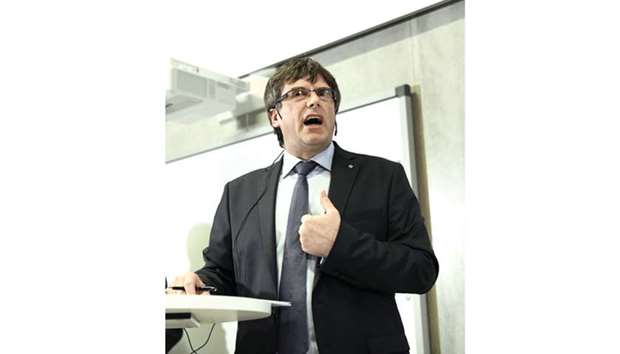Puigdemont and his supporters insist that he can rule from self-imposed exile in Belgium, where he fled to in October to avoid arrest for his part in organising a banned referendum on a split from Spain and the consequent declaration of independence.
Madrid has rejected this possibility and said it will challenge any attempt by him to rule remotely in the courts.
Puigdemont said yesterday that the independence movement would not bow to Spanish authority in comments during a debate held in the University of Copenhagen.
“We will not surrender to authoritarianism,” Puigdemont said at the event, which marked his first trip away from Belgium in three months.
Puigdemont became the top candidate to lead the wealthy northeastern region again after elections in Catalonia last month gave secessionists a slim majority.
“Soon we will form a new government... it’s time to end their oppression and find a political solution for Catalonia,” he added.
The 55-year-old former journalist potentially faces decades of jail in Spain if he is convicted of the charges levelled against him, including rebellion and sedition, for organising the referendum and declaring Catalonia’s independence.
Rajoy and his ministers have said they would appeal to the courts and maintain Madrid’s direct rule of Catalonia if Puigdemont was elected while abroad.
Foreign Minister Alfonso Dastis said yesterday in Brussels that “proposing a fugitive of justice” to head the Catalan government was not the “best start” for the new parliamentary term in Catalonia.
However, the Catalan parliament’s speaker said that Puigdemont was the only candidate chosen by parliament to rule the region.
“I am conscious of the warnings that weigh upon him, but I am also conscious of his absolute legitimacy to be candidate,” Roger Torrent said.
Catalonia’s parliament must hold its first vote of confidence on the new leader by January 31.
Meanwhile, Spain’s Supreme Court rejected yesterday a request from the state prosecutor to reactivate a European arrest warrant to detain Puigdemont while he is in Copenhagen.
Supreme Court Judge Pablo Llarena turned down the request, arguing that Puigdemont had gone to Denmark “to provoke this arrest abroad” as part of a strategy to boost his arguments in favour of being allowed to be sworn in as president of Catalonia again.
In early December, Llarena had dropped a European arrest warrant for Puigdemont and four of his deputies who fled to Belgium, saying that it would complicate the overall probe into the region’s leaders – but warned they would be arrested if they return.
Puigdemont’s visit to Denmark could help him avoid problems in Belgium, where European citizens can live without a residency permit for three months, after which they theoretically have to leave.
If they return they can stay another three months.
While at first glance a blow to Madrid’s efforts to have Puigdemont arrested, the court’s decision could also make it more difficult for the former Catalan leader to be allowed to vote.
Spanish laws make it easier for someone in detention than for someone who is abroad to be granted a parliamentary proxy.
In Copenhagen, Puigdemont declined to comment any further on the day’s events.
After weeks of uneasy calm, the political crisis triggered by Catalonia’s independence drive flared up again last week when the new regional parliament elected Torrent as speaker at its first sitting.
Despite that tension, Spain’s borrowing costs fell to six-week lows yesterday after credit agency Fitch upgraded its sovereign rating to give Spain its first “A-” grade since the eurozone debt crisis.
According the Danish parliament’s diary, Puigdemont has also been invited to a meeting there today by Magni Arge, a deputy representing the Faroe Islands, which have their own independence movement seeking secession from Denmark.

